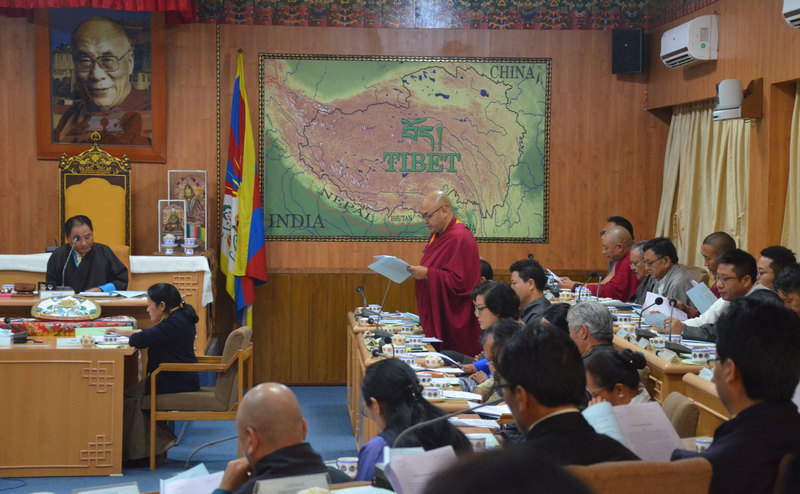Dharamshala, India — The Tibetan Parliament in-Exile unanimously passes a resolution condemning China’s interference in the reincarnation of His Holiness the Dalai Lama, calling Beijing to end it's politicised campaigns to co-opt Tibetan reincarnation system. The next Dalai Lama would be the 15th incarnation over an unbroken lineage that has lasted some 500 years.
The Tibetan Parliament-in-Exile on Friday, September 21, 2019, vehemently condemned China’s brazen meddling in the reincarnation of His Holiness the Dalai Lama and the politicization of the sacred institution of the Tibetan reincarnation.
The resolution unanimously passed at the 8th session of the 16th TPiE strongly condemned the Chinese government’s interference in the reincarnation of His Holiness the Dalai Lama and firmly stated that the final authority on decisions relating to the reincarnation of His Holiness the Dalai lama rests indisputably and completely with His Holiness the Dalai Lama himself and not with the leaders of the atheist Communist Party of China.
The Tibetan parliament unanimously reaffirmed the supreme spiritual authority of His Holiness the Dalai Lama over Tibetan Buddhism, and the special karmic relationship between the Dalai Lama and the people of Tibet. “His Holiness the Dalai Lama is the heart and soul of Tibetans inside Tibet and in exile,” the parliament said in the resolution.
The resolution also criticized China’s politicised campaigns to co-opt Tibetan reincarnation system, citing the recent “training session on reincarnation for a living Buddha” that began 23 August this year in Lhasa targeting around 100 Tibetan Buddhist monks from 73 monasteries across Tibet.
"The practice of reincarnation is very unique to the Tibetan Buddhist world and China cannot duplicate it or manufacture it," the democratically elected head of the Tibetan Government in-Exile, Dr Lobsang Sangay recently said while speaking at the Center for Strategic and International Studies, a think tank based in Washington, D.C., in the United States, on the subject of 'Reincarnation in Tibetan Buddhism'.
Answering a question about the issues related to the next reincarnation of His Holiness the Dalai Lama, Prof Samdhong Rinpoche, former Prime Minister of the Tibetan government in-Exile and envoy of His Holiness the Dalai Lama Office recently told Indian media, “not by government of China neither the Government of India has anything to do with that and that has been made very clear by His Holiness' 2011 declaration. That’s very clear in the public domain so there is no question of India’s intervention or China’s intervention”.
In an exclusive interview in March this year, His Holiness the Dalai Lama told Reuters news agency that following his own death, his next incarnation might be recognized in India, where he has lived in exile since 1959 after China's illegal invasion and ruthless occupation of Tibet.
“China considers Dalai Lama’s reincarnation as something very important. They have more concern about the next Dalai Lama than me,” His Holiness told the Reuters. “In future, in case you see two Dalai Lamas come, one from here India, in a free country, one chosen by Chinese, then nobody will trust, nobody will respect the one chosen by China. So that’s an additional problem for the Chinese! It’s possible, it can happen.”
His Holiness has also previously suggested that the lineage of the Dalai Lama could end when he dies. “The Dalai Lama institution will cease one day. These manmade institutions will cease,” His Holiness told BBC in 2014. “There is no guarantee that some stupid Dalai Lama won’t come next, who will disgrace himself or herself. That would be very sad. So, much better that a centuries-old tradition should cease at the time of a quite popular Dalai Lama.”
In a public statement in 2011, His Holiness the Dalai Lama emphasized, “Reincarnation is a phenomenon which should take place either through the voluntary choice of the concerned person or at least on the strength of his or her karma, merit, and prayers. Therefore, the person who reincarnates has sole legitimate authority over where and how he or she takes rebirth and how that reincarnation is to be recognized. It is a reality that no one else can force the person concerned, or manipulate him or her.”
His Holiness the 14th Dalai Lama is known throughout the world as a leading advocate for world peace and non-violence. His message is one of kindness and compassion to all sentient beings. Over the past 60 years, he has traveled around the world spreading a message of Peace and Universal Responsibility.
He also believes that the common aim of all religions, an aim that everyone must try to find, is to foster tolerance, altruism, and love. He retired from politics in 2011. But, as one among six million Tibetans, His Holiness said he will continue to serve the cause of Tibet.
In 1959, His Holiness the 14th Dalai Lama along with thousands of others escaped to India, where he was given political asylum. The spiritual leader has set up a government and rebuilt monasteries where masters pass on their teachings to young monks. Tibetans in exile have succeeded in gradually rebuilding their monasteries, preserving their culture, restructuring their society and keeping it alive, in spite of the extremely difficult circumstances.
The Chinese Communist totalitarian regime (PRC) began their invasion of Tibet in 1949, reaching complete occupation of the country in 1959. Since that time, more than 1.2 million people, 20% of the nation's population of six million, have died as a direct result of China's illegal invasion and ruthless occupation. In addition, over 99% of Tibet's six thousand religious monasteries, temples, and shrines, have been looted or decimated resulting in the destruction of hundreds of thousands of sacred Buddhist scriptures.


![Tibet has a rich history as a sovereign nation until the 1950s when it was invaded by China. [Photo: File]](/images/stories/Pics-2024/March/Tibet-Nation-1940s.jpg#joomlaImage://local-images/stories/Pics-2024/March/Tibet-Nation-1940s.jpg?width=1489&height=878)
















